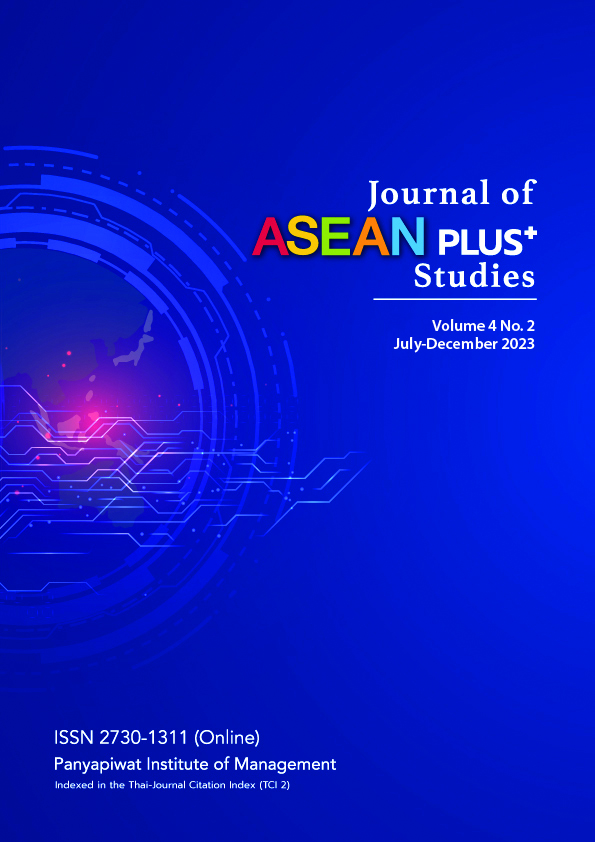Enhancing University Education Business: Motivations of Chinese Students Studying in Thailand
Keywords:
Motivations, Chinese Students, Education Services, Thai universityAbstract
This qualitative study investigates the motivations driving Chinese students to pursue higher education in Thailand, focusing on both undergraduates and doctoral students during the academic years 2021 and 2022. This research comprises 15 Chinese doctoral students enrolled at a public university in Bangkok and 43 Chinese undergraduates in bachelor’s programs at a private university.
Data collection occurred in two phases: the frst during the second semester of 2021, targeting undergraduates, and the second in the frst semester of 2022, focusing on doctoral students. Content Analysis was employed as the chosen methodology for data analysis, with the overarching aim of enhancing educational services for Chinese students in Thailand.
Chinese students are drawn to Thai universities for various compelling reasons. These institutions uphold rigorous educational standards and offer flexible teaching methods that accommodate in-person, onsite, and online learning preferences. Language barriers are adeptly addressed through Chinese translators, facilitating the seamless translation of academic content, while instructors
profciently switch between Thai and Chinese during lectures. An integrated approach encourages Chinese students to develop Thai language skills alongside their chosen felds of study, with some even engaging in teaching Chinese to Thai high school students, thus creating potential career opportunities in education. Doctoral programs offer more intensive and complex instruction, including
in-depth examples and case studies. Graduate students express profound satisfaction with the quality of education and deeply value the unexpected insights gained during their studies. In summary, Chinese students are increasingly drawn to Thai universities due to their unwavering commitment to high educational standards, adaptable teaching methods, comprehensive language support, and the unique opportunities for language acquisition and teaching experience they offer. This enriching academic environment not only benefts Chinese students but also contributes positively to Thailand’s educational landscape and internationalization efforts.
References
Altbach, P. G., & Knight, J. (2007). The internationalization of higher education: Motivations and realities. Journal of Studies in International Education, 11(3-4), 290-305.
Berry, J. W. (1980). Acculturation: Theory, models, and some new fndings. Westview Press.
Deng, S., & Dart, L. (2009). Implementing lean six sigma in a higher education institution: A case study. Quality Assurance in Education, 17(1), 64-75.
Dwyer, M. M., & Peters, C. K. (2004). The benefts of study abroad. Transitions Abroad, 32(5), 56-59.
Gu, Q. (2019). The role of English language in Thai-Chinese business education collaboration. Language and Intercultural Communication, 19(4), 377-392.
Hofstede, G. (1980). Culture’s consequences: International differences in work-related values. sage publications.
House, R. J., Hanges, P. J., Javidan, M., Dorfman, P. W., & Gupta, V. (2004). Culture, leadership, and organizations: The GLOBE study of 62 societies. Sage Publications.
Kanchanopast, S. (2020). Exploring curriculum integration in Thai-Chinese business education collaborations. Comparative Education Review, 64(3), 402-425.
Kaymakci, K., & Akyuz, E. (2018). Implementation of total quality management in higher education institutions: A literature review. Educational Research and Reviews, 13(10), 356-366.
Lim, S. (2022). Bilateral Cooperation in Higher Education between China and Thailand for the Belt and Road Initiative (BRI). Research Fellow Department of Geography, National University of Singapore.
Long, P. M. (2012). Improving higher education using lean six sigma: A critical review of the literature. Quality Assurance in Education, 20(3), 300-315.
People’s Republic of China, the State Council. (2018, April, 30). President Xi Jinping attends national education conference and delivers important speech. https://shorturl.asia/Bz0iZ
Premsmit, P. (2018). Innovation and creativity in Thai-Chinese business education joint ventures. Journal of Research in International Education, 17(3), 213-230.
Priemsamorn, C. (2016). Thai-Chinese collaborative programs in business education: A case study analysis. Journal of International Education and Business, 3(2), 22-35.
Suwannatthachote, P. (2015). Cultural dimensions in Thai-Chinese business education partnerships. International Journal of Intercultural Relations, 49, 178-191.
Thai PBS. (2023, March 29). Thai university destination for chinese students, education business and the future of the new generation. https://www.thaipbs.or.th/news/content/325787 [in Thai]
Wei, L. (2018). Cross-cultural challenges and opportunities in Sino-Thai business education partnerships. Asia-Pacifc Journal of Business Administration, 10(4), 298-315.
Yusof, N., & Bajuri, N. H. (2017). The implementation of total quality management in higher education institutions: Challenges and enablers. International Journal of Academic Research in Business and Social Sciences, 7(11), 208-218.






